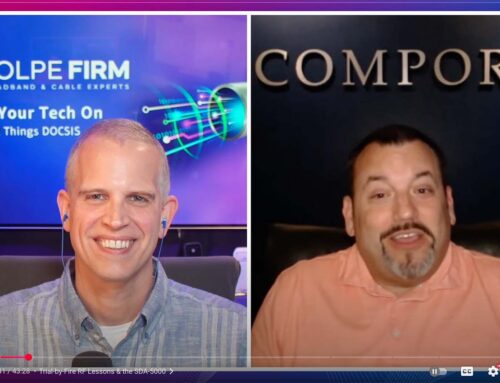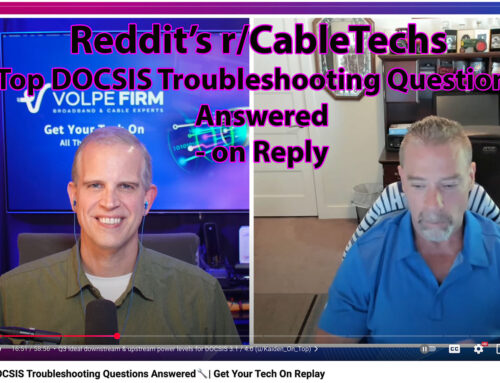Podcast: Play in new window | Download | Embed
Subscribe: Spotify | Email | RSS | More
DOCSIS 3.1 Backwards Compatible so it can Co-Exist with Legacy DOCSIS
Episode 5 Hosted by Brady Volpe of the Volpe Firm and Nimble This with Guest John Downey of Cisco. DOCSIS 3.1 backwards compatible is good news. Other discussion highlights:
- Remote PHY
- Different bandwidths in DOCSIS 3.1
- Difference between DFB, FP and digital returns
- Legacy DOCSIS and DOCSIS 3.1 can coexistist in the same bandwidth
- DOCSIS 3.1 capacity planning can be a challenge since modulation can change dynamically
We do our best to bring our audience great technical content every month. You can watch us live on the air or catch our recorded episodes on YouTube. Or download our audio only version with your favorite podcatcher.
If you have enjoyed this episode, please do hit the subscribe button so that you never miss an episode.
Thank you so much for being here and we will see you next month.
Upcoming events can be seen under Broadband Events. Previous events can be seen under the blog.
- If you are watching this on youtube please hit the subscribe button!
- Let us know what you think and remember to share!
- You can find slides at the bottom of the page and some on slideshare.
- Find out about events or articles by following us on Twitter, LinkedIn or Facebook too.
Also available on iTunes, Google Podcasts, Spotify, vurbl see podcasts “get your tech on”.





Brady,
Do we see any OSP re-calibration requirements due to the high Peak-average ration of power levels in OFDM?
Rajeev Gambhir
Hi Rajeev,
PAPR (peak-to-average power ratio) in OFDM is a consideration in DOCSIS 3.1. However until we get actual hardware we won’t know how much internal calibration the chipset vendors have done for us. So this is certainly a factor we will be looking at. We are optimistic that a lot of the correction will be done. What is more of a concern is the impact of PAPR on return path lasers and even forward path amplifiers. Even worse is PAPR in the low cost in-home amplifiers that many homeowners purchase. These likely will not be able to handle the extra peak power from OFDM signals.
-Brady
fine!thx!